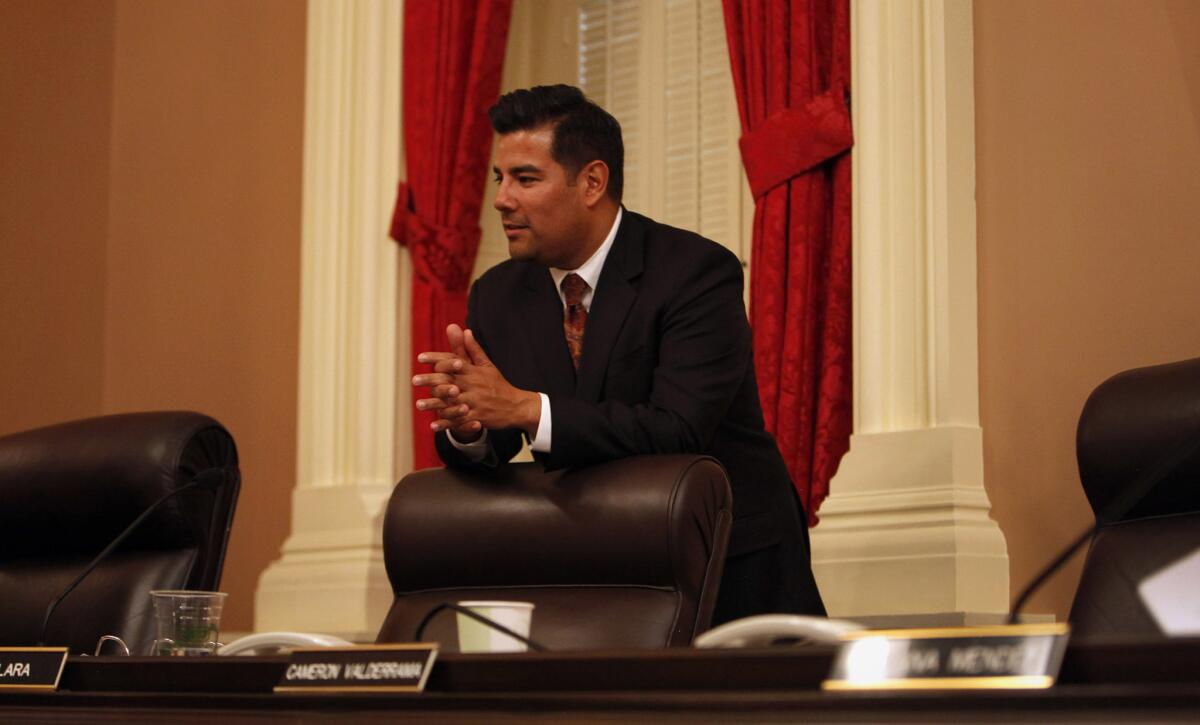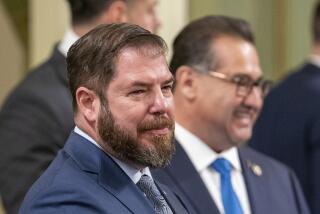State Senate OKs measures on immigrant healthcare, e-cigarettes

State Sen.
SACRAMENTO — The state Senate approved a hotly debated measure Tuesday that would provide healthcare coverage to many immigrants who reside in California illegally.
Lawmakers also gave the first full-house approval to bills that would raise the state smoking age to 21, prohibit the use of electronic cigarettes in the same way smoking is banned, provide more public grants for university students and automatically register to vote all eligible residents who obtain a driver’s license.
The healthcare proposal would allow up to 240,000 immigrants younger than 19 to enroll in Medi-Cal, California’s health program for the poor, and an unspecified number of low-income adult immigrants to receive the same services from a separate program.
Others could buy non-government coverage through the Covered California insurance exchange if the federal government reverses its ban on the practice.
State Sen. Ricardo Lara (D-Bell Gardens), author of the proposal, said it provides “what we can realistically achieve now” for many of the estimated 2 million people in the state illegally.
“We are talking about our friends. We are talking about our neighbors and our families who are denied basic healthcare in the richest state of this union,” said Lara, the son of immigrants who were formerly in the country illegally.
The bill’s prospects are uncertain. Legislative analysts have not yet calculated the cost, and Gov. Jerry Brown has said he prefers not to significantly expand health coverage for unauthorized residents.
He included money in his latest proposed budget to insure those who would be affected by President Obama’s deportation relief order, which is on hold. But Brown declined to comment Tuesday on Lara’s bill, which passed 28 to 11.
Only two Republicans said yes. Sen. Andy Vidak (R-Hanford) supported the measure, SB 4, saying, “The taxpayers are already paying high healthcare costs for undocumented when they show up in our emergency rooms.”
Sen. Jeff Stone (R-Temecula) said the proposal would worsen a shortage of physicians to treat patients on Medi-Cal: “This bill would only add hundreds of thousands of patients to the rolls with no one to care for them.”
The measure now goes to the Assembly, with other proposals the Senate passed Tuesday.
One of those would raise the legal age for buying tobacco products from 18 to 21, part of an effort to reduce smoking by young people.
Sen. Ed Hernandez (D-West Covina) said he introduced the bill, SB 151, out of concern that an estimated 90% of tobacco users start before reaching 21.
“It’s time to stop allowing tobacco companies to make the deadly product so readily available to our youth,’’ he said.
Opponents include the Cigar Assn. of America, which argued that Californians can vote and serve in the military at 18 and should be able to make their own decisions concerning smoking at that age.
The vote was 26 to 8.
Senators also advanced a bid to ban electronic cigarettes from restaurants, theaters and other public places where smoking is prohibited.
The bill, by Sen. Mark Leno (D-San Francisco), would treat e-cigarettes, also known as “vaping” devices, as tobacco products because they often use nicotine.
“The fastest growth segment of new users is among middle and high school students who are now smoking electronic cigarettes,” Leno told his colleagues.
The measure, SB 140 passed 24 to 12, with Stone the lone Republican voting for it.
Senate Republican leader Robert Huff of Diamond Bar said e-cigarette vapor does not spread as much as tobacco smoke, so the devices should be treated differently.
In addition, Huff said, “e-cigs are used by people trying to kick the tobacco habit.” He said the state should await federal action on the cigarettes.
Legislation also passed the Senate that would give more state aid to students in California’s public university systems.
Sen. Marty Block (D-San Diego), the author, said he wants to make higher education more affordable and encourage students to graduate sooner.
His measure would provide Cal State students with grants of $1,000 if they finish 30 units the first year; $1,500 more for finishing 60 units by the end of the second year; and $2,000 more if they complete 90 units by the end of the third year.
Block also wants to increase the number of Cal Grant scholarships for low-income students from 22,500 to 30,000. In addition, it would set the grant at $9,084 for recipients at private universities and delete a scheduled reduction to $8,056 for new recipients at private colleges.
The measure, SB 15, passed 35 to 0.
Senators voted unanimously to make it a felony with prison time for a sex offender to remove or disable a GPS tracking device.
The author of SB 722, Sen. Pat Bates (R-Laguna Niguel), noted that many offenders are being charged with committing new crimes when they should have been subject to state tracking but had evaded it.
The Times has reported, for example, that two transients accused of killing four women in Orange County had a history of cutting off their GPS trackers and even leaving the state.
Meanwhile on Tuesday, the Assembly passed a proposal to register to vote all eligible Californians who get a driver’s license unless they opt out.
The bill, AB 1461 by Assemblywoman Lorena Gonzalez (D-San Diego), is a response to particularly low voter turnout in some recent elections. It passed 45 to 25 and moves to the Senate.
Twitter: @mcgreevy99
Twitter: @melmason
More to Read
Sign up for Essential California
The most important California stories and recommendations in your inbox every morning.
You may occasionally receive promotional content from the Los Angeles Times.












